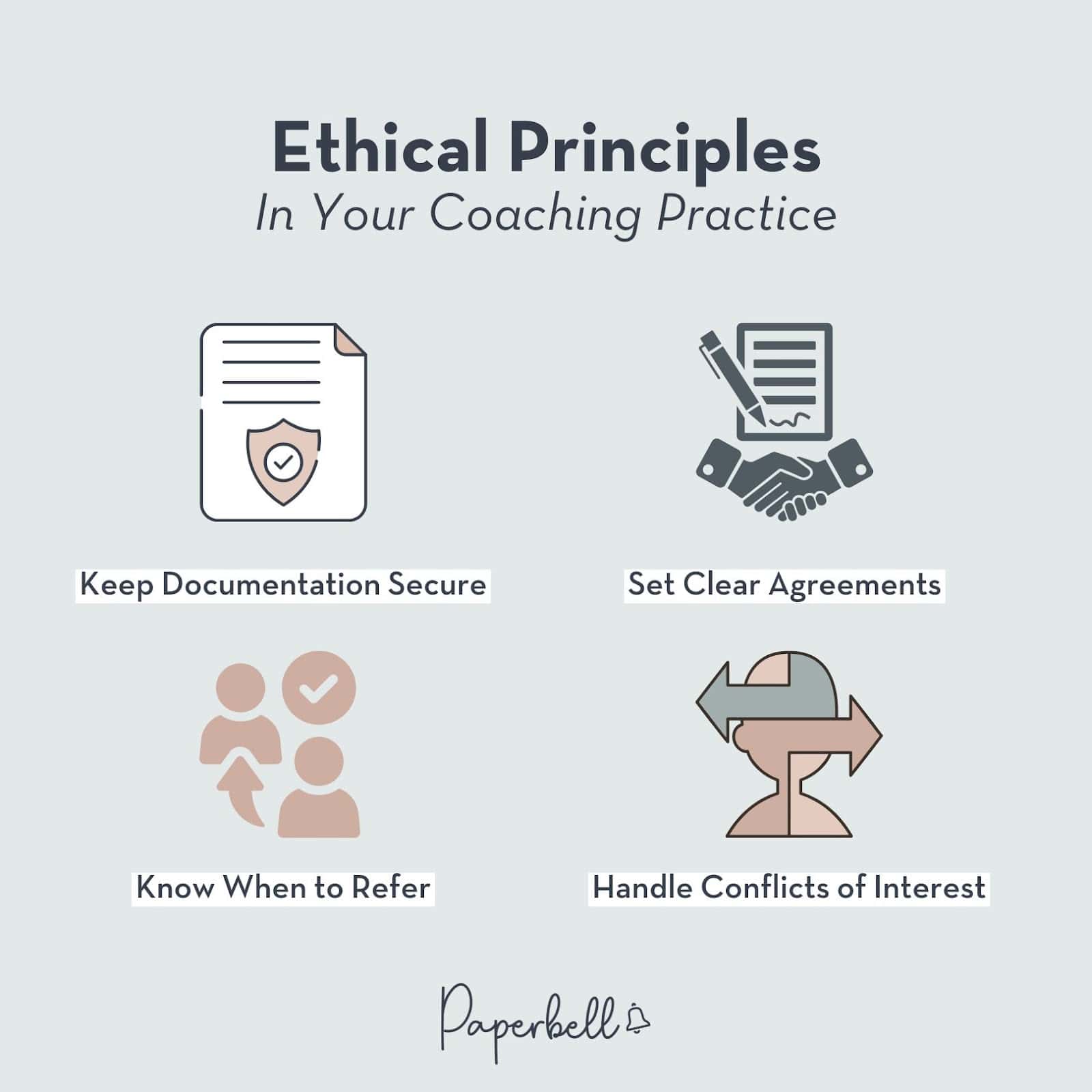Every coach is responsible for running their practice ethically, whether certified or not. Keeping a few universally accepted guidelines in mind lets you create a trusting space for clients and protect your business, as well as the credibility of the industry as a whole.
Let’s explore the most widely accepted ethical standards in coaching.
Note: This article is for informational purposes only and does not constitute legal advice.
What Are Ethics in Coaching?
Coaching ethics are the guiding principles that shape how you conduct yourself as a coach. They’re there to:
- Protect you from legal risks or reputational damage.
- Protect your clients by creating a safe space for them to grow.
- Protect the profession by maintaining its credibility and ethical standards.
When you adhere to a code of ethics, you show your clients you take your role seriously. It’s the foundation of trust and professionalism, and helps your clients feel confident about working with you.
The Two Main Codes of Ethics in Coaching
The two most widely known codes of ethics in the coaching industry are:
- The Code of Ethics of the International Coach Federation (ICF)
- The Global Code of Ethics, co-signed by the European Mentoring and Coaching Council (EMCC) and the Association for Coaching (AC)
To pass a certification exam by any of these organizations, you generally have to demonstrate your understanding of these principles and commitment to ethical conduct. However, all coaches are recommended to follow them.
The current version of the ICF’s ethical standards is divided into four sections. Here’s a brief summary of what they address.
- Responsibility to clients: Setting clear agreements, maintaining confidentiality, managing conflicts of interest, and ensuring culturally sensitive interactions.
- Responsibility to practice and performance: Ongoing professional development, being transparent about personal limitations, and resolving conflicts of interest.
- Responsibility to professionalism: Setting appropriate boundaries and educating others about ethical responsibilities.
- Responsibility to society: Avoiding discrimination, respecting intellectual property, and promoting fairness.
The Global Code of Ethics discusses similar points to the ICF’s code, including confidentiality, fairness, and professionalism. In addition, it emphasizes collaboration and coaching as a tool for positive societal change in more detail.
Running your business based on these principles demonstrates an ethical practice clients can trust.
How to Implement Ethical Principles Into Your Coaching Practice
Here are some real-life coaching scenarios where ethical conduct is important and how you can make sure you stick to it.
Keep Documentation Secure
Store client notes, surveys, and session recordings in a secure place to ensure they stay confidential.
If you’re using Paperbell, each client’s information will be kept safe and private in your account, ready to be accessed anytime. For session recordings, you can use Zoom and download them on your computer.
To protect yourself from any possible data breaches, you may want to consider getting life coaching insurance that covers cyber liability.
Set Clear Agreements
Make sure your clients know what to expect from the start. This includes what you offer and don’t offer as a part of your services, payment terms, your cancellation policy, and the terms of terminating the coaching engagement.
With Paperbell, you can get your standard coaching contract signed as a part of your automated client onboarding flow. New clients can only book you once they have settled their outstanding payments and signed your agreement.
Know When to Refer
Sometimes, a client may need support beyond your expertise. Be transparent about your qualifications and the limits to how you can help them.
Ethical development means prioritizing the client’s choices and welfare over personal gain. If they would benefit more from working with another coach (someone with a different specialty or expertise), let them know.
If they need medical help or should see a psychologist, refer them to a trusted professional or suggest they seek adequate help.
Handle Conflicts of Interest
Whether it’s personal or professional, address any potential conflicts of interest and set appropriate boundaries. If necessary, refer the client to someone else. Here are some ethical reflections about possible conflicts of interest:
- Personal relationships: If you’re coaching someone you have a personal relationship with (like a friend, family member, or romantic partner) or you’re developing feelings for a client, it could cloud your judgment or objectivity.
- Financial conflicts: If you have a financial stake in recommending certain products, services, or people to your client, it could compromise your ability to offer unbiased advice.
- Clients with competing interests: If you’re coaching multiple clients whose goals or interests conflict, it may be hard to remain neutral or maintain confidentiality.
- Dual roles: If you’re acting as both a coach and a consultant or advisor in a professional context, it might blur the lines of what’s expected of you—here’s how you can work as a coaching consultant ethically.

FAQ
How Do I Handle Potential Conflicts of Interest in Coaching?
If a conflict of interest arises, such as personal ties to the client or association with a competing business, address it as early as possible.
Communicate your professional boundaries and disclose any such situation transparently so your client can make informed decisions about the coaching engagement. If necessary, refer them to another professional who can better serve their needs.
What Are the Limits of Confidentiality in Coaching?
Generally, any information about the coaching engagement should only be shared with the client’s permission.
If you need to share session recordings or other information with your mentor coach or supervisor, this should be made clear to the coachee beforehand. The same applies in workplace coaching where you may have to convey progress reports or other information about the coachee to their manager or HR.
Additionally, you may need to break confidentiality if there’s convincing evidence of serious danger or harm to the client or others or if required by law (e.g., court orders).
What Coaching Documentation Should I Keep?
Keep records of client agreements, session notes and recordings, feedback, and any important communications. Ensure these documents are stored securely to protect client privacy.
Build a Strong Foundation for Your Coaching Practice
Sticking to these ethical standards sets your business up for success and following them is easy when you organize your client information with Paperbell.
It’s an all-in-one coaching website and client management tool that keeps your client data secure and simplifies contract signing, among many other ways of automating your business.
Try Paperbell for free today and discover all its features.










